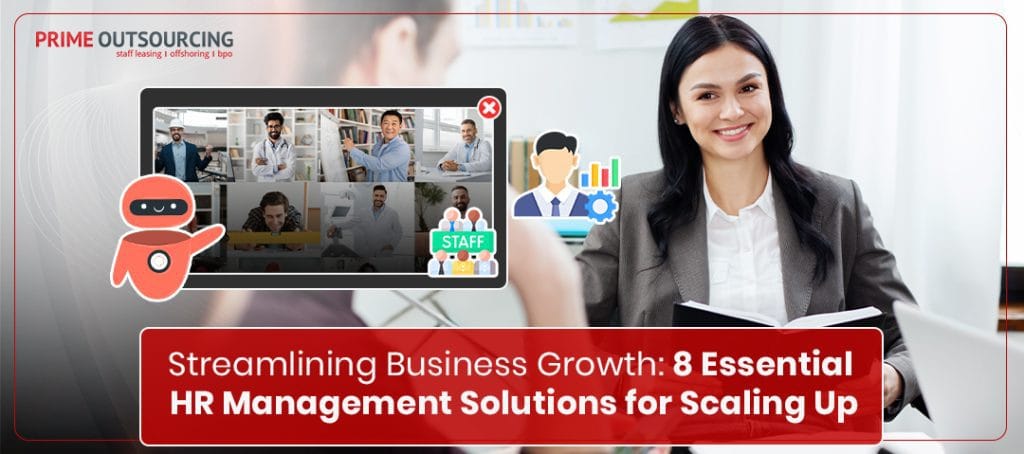
As businesses grow, efficient human resource management becomes critical to ensuring smooth operations and long-term success. HR management solutions are no longer limited to handling administrative tasks—they have become a strategic element in business expansion.
Implementing the right HR management solutions can streamline processes, improve workforce productivity, and support the overall scaling efforts.
In this blog, we will discuss the eight essential HR management solutions to help your business grow effectively.
What is Human Resource Management?
Human Resource Management (HRM) is the strategic approach to managing an organization’s employees. It involves hiring, training, evaluating, and managing employee relations to ensure a productive and satisfied workforce. HRM plays a critical role in shaping company culture, improving employee engagement, and aligning workforce goals with business objectives.
Key Components of HRM
The following are the key components of Human Resource Management:
| Components | Purpose |
|---|---|
| Recruitment and Staffing | Recruitment and staffing involve identifying, attracting, and hiring the right talent to meet organizational needs. This function ensures that the company has the necessary workforce to achieve its goals, from entry-level roles to executive positions. |
| Training and Development | Training and development focus on enhancing employees’ skills, knowledge, and capabilities to perform their roles effectively and prepare them for future responsibilities. This function supports career growth and helps the organization adapt to evolving industry trends. |
| Performance Management | Performance management aims to maintain and improve employee productivity by setting goals, providing regular feedback, and assessing individual and team contributions. It’s essential for aligning employees’ work with the organization’s objectives. |
| Compensation and Benefits | Compensation and benefits involve designing and managing a package of pay, incentives, and perks to attract and retain talent. A fair and competitive compensation system is vital for employee satisfaction and motivation. |
| Employee Relations | Employee relations focus on fostering a positive and productive workplace environment by addressing employee concerns, improving workplace culture, and resolving conflicts. This function helps maintain high morale and job satisfaction. |
| Compliance with labor Laws | Compliance with labor laws ensures that the organization adheres to federal, state, and local employment regulations, minimizing legal risks and promoting ethical standards in the workplace. |
History of Human Resource Management
The roots of HRM can be traced back to the Industrial Revolution (18th and 19th centuries) when the need to manage workers in large factories emerged. Early forms of HR focused on worker welfare, safety, and basic rights.
Key Developments
Let’s discuss how Human Resource Management developed through the years:
| Period | Development |
|---|---|
| Industrial Welfare Movement (Early 20th Century) | During this time, the welfare of workers gained more attention, and efforts were made to improve working conditions. |
| The Rise of Personnel Management (1920s-1940s) | This era saw companies establishing “Personnel Departments” focused on hiring, training, and addressing employee grievances. |
| Modern HRM (Post-1970s) | In the late 20th century, HR transitioned to a strategic role, incorporating performance management, organizational development, and employee engagement as core elements. Advances in technology also led to the development of HR Information Systems (HRIS) and automated processes. |
| Contemporary HRM | Today, HRM is data-driven and technologically advanced, using analytics, artificial intelligence, and strategic planning to enhance decision-making, productivity, and employee well-being. |
Importance of Human Resource Management to Businesses
Aligns Workforce with Business Goals
HRM ensures that the workforce is aligned with the company’s strategic goals. By hiring and developing employees who fit the organization’s culture and objectives, HR helps drive business success.
Boosts Employee Performance and Engagement
Effective HR practices, such as clear communication, regular feedback, and career development opportunities, lead to higher productivity and job satisfaction.
Reduces Employee Turnover
HRM focuses on employee retention by addressing key areas like career growth, competitive benefits, and a positive work environment, which reduces turnover costs.
Ensures Compliance and Reduce Legal Risks
HRM ensures compliance with labor laws, health and safety regulations, and industry standards. This protects the business from legal issues and promotes a safe workplace.
Fosters a Positive Workplace Culture
HRM helps shape a healthy workplace culture through policies and initiatives that promote diversity, inclusion, and work-life balance.
Enhances Adaptability
As business environments change, HRM helps companies adapt through workforce planning, training, and implementing new technologies, making the business more resilient and agile.
Supports Innovation and Growth
By recruiting top talent, fostering skill development, and promoting a culture of continuous learning, HRM enables companies to innovate and scale effectively.
HR Management Solutions
1. Implementing HR Automation: Enhancing Efficiency
HR automation reduces the time spent on manual operations like benefits administration, payroll, and attendance monitoring. These laborious procedures can be automated to save HR teams time for high-value projects like strategy planning and staff development.
Deloitte reports that businesses using HR automation experience a 40% increase in operational efficiency. This HR management solution helps reduce errors, enhances compliance, and provides real-time data for better decision-making.
Key Benefits of HR Automation:
- Reduces administrative workload
- Minimizes human errors
- Ensures accurate and timely reporting

2. Adopting a Cloud-Based HR Management System (HRMS)
A comprehensive solution for handling employee data, performance evaluations, and communication is provided by cloud-based HRMS platforms, especially for companies with dispersed or remote teams. Scalability and flexibility are guaranteed by these solutions, which can adjust as your business expands.
According to Oracle, 75% of HR leaders believe that cloud-based HR management solutions are essential for future success. This technology allows businesses to manage their workforce efficiently, ensuring streamlined HR operations regardless of scale.
Key Features of a Cloud-Based HRMS:
- Centralized data management
- Real-time performance tracking
- Remote access to HR tools

3. Outsourcing HR Functions: Focusing on Core Business
Businesses can stay flexible and concentrate on their main competencies by outsourcing non-essential HR tasks like payroll processing, hiring, and benefits administration. Companies wishing to grow without overstretching their internal teams can find success with HR outsourcing as an HR management solution.
A 2023 SHRM report found that 62% of companies experienced improved service quality and reduced costs after outsourcing HR functions. This solution is especially beneficial for businesses looking to expand without significantly increasing overhead.
Commonly Outsourced HR Functions:
- Payroll and benefits management
- Recruitment and onboarding
- Compliance and risk management

4. Introducing Employee Self-Service (ESS) Portals
Employee self-service (ESS) portals give employees quick access to their personal HR data, including benefits, time-off balances, and pay stubs. This HR management solution frees up HR staff to work on more important projects by enabling employees to handle some aspects of their jobs on their own.
Gartner reports that organizations implementing ESS portals saw a 58% reduction in HR support requests. ESS portals are not only convenient for employees, but they also streamline internal HR operations.
Benefits of ESS Portals:
- Reduces HR administrative workload
- Increases employee autonomy
- Enhances transparency and accessibility

5. Leveraging Performance Management Systems
Performance management systems offer continuous feedback, goal alignment, and real-time performance evaluations. Instead of relying on traditional annual reviews, businesses can use agile performance management to stay aligned with their growth objectives.
A Gallup study found that companies using dynamic performance management systems see a 20% increase in employee productivity. This HR management solution is essential for aligning employee goals with overall business growth, ensuring continuous improvement.
Advantages of Performance Management Systems:
- Real-time feedback and evaluations
- Clear goal-setting and alignment
- Enhanced employee productivity

6. Developing Learning and Development (L&D) Programs
As businesses scale, it’s crucial to invest in continuous employee development. Learning and Development (L&D) programs enable employees to stay updated with industry trends, acquire new skills, and contribute to business growth.
A LinkedIn Learning report from 2023 revealed that 93% of companies consider L&D a key HR management solution for long-term success. Companies that provide regular training see a 23% increase in employee productivity, contributing to overall business agility.
Key L&D Focus Areas:
- Leadership and management training
- Technical skills enhancement
- Soft skills and team collaboration

7. Streamlining Recruitment with Technology
Recruitment technology, such as Applicant Tracking Systems (ATS) and AI-powered screening tools, enables businesses to hire top talent efficiently. These HR management solutions shorten the time-to-hire and improve the quality of candidates, which is essential when scaling up.
Recruitment Technologies to Consider:
- Applicant Tracking Systems (ATS)
- AI-driven candidate screening
- Automated interview scheduling

8. Enhancing Employee Engagement and Retention
Maintaining employee engagement is critical for growth. Engaged employees are more productive and committed, which positively impacts business performance. HR management solutions, such as employee engagement platforms, provide tools for real-time feedback, recognition, and wellness programs.
Key Features of Employee Engagement Platforms:
- Real-time feedback and recognition tools
- Wellness programs and mental health support
- Employee satisfaction tracking
Why Invest in HR Management Solutions?
Investing in HR management solutions is essential for businesses aiming to thrive in a competitive landscape. These solutions streamline and optimize HR processes, enhancing the overall productivity and efficiency of an organization. Here’s why implementing HR management solutions is a smart investment:
Improved Efficiency and Productivity
HR management solutions automate time-consuming tasks like payroll, benefits administration, and attendance tracking, freeing up HR staff to focus on strategic initiatives. By reducing administrative burden, businesses can improve productivity across departments.
Enhanced Employee Experience
With features such as self-service portals, **HR management solutions** empower employees to access their information, manage leave, and review benefits on demand. This convenience not only improves satisfaction but also reduces the volume of inquiries to HR, creating a more autonomous and engaged workforce.
Data-Driven Decision Making
HR management solutions provide valuable analytics and insights into workforce trends, performance, and engagement. Real-time data allows businesses to make informed decisions, from talent acquisition to employee retention strategies, enabling a more proactive approach to workforce management.
Scalability for Growing Businesses
As businesses expand, **HR management solutions** can easily scale, adapting to increased employee counts and more complex processes. Cloud-based HR systems, in particular, offer flexibility, enabling remote access and integration with other business systems to support growth seamlessly.
Enhanced Compliance and Reduced Risk
Staying compliant with labor laws and industry regulations is critical, and HR management solutions help companies maintain accurate records and conduct regular audits. Automated compliance updates ensure that businesses reduce the risk of costly legal issues and maintain a fair, transparent workplace.
Cost Savings
While an initial investment is required, **HR management solutions** often lead to substantial cost savings in the long run by reducing errors, improving retention, and eliminating the need for excessive manual work. By managing HR functions more efficiently, companies can allocate resources to higher-impact areas.
Strategic Workforce Planning
With predictive analytics and talent management features, HR management solutions support long-term workforce planning. These tools help identify skill gaps, forecast hiring needs, and plan for succession, ensuring a future-ready team that aligns with business goals.
| Why Invest in HR Management Solutions? |
|---|
| It improves business efficiency and productivity. |
| HR Management Solutions enhance employee experience. |
| HR management solutions provide valuable analytics and insights into workforce trends, performance, and engagement. |
| HR management solutions scale easily, adapting to growing employee numbers and complex processes. |
| HR management solutions boost compliance and reduce risk. |
| It often leads to substantial cost savings in the long run. |
| These solutions support long-term workforce planning. |
In summary, HR management solutions are an investment in a company’s operational strength and future success. By improving efficiency, enhancing the employee experience, and supporting data-driven strategies, these solutions lay a solid foundation for sustainable growth and competitiveness.
Upgrade Your HR Management Solutions with PrimeOutsourcing!
Implementing the right HR management solutions is essential for businesses aiming to scale effectively. By focusing on HR automation, employee engagement, and continuous development, businesses can ensure they have the right foundation for sustainable expansion.
Investing in these HR management solutions will not only enhance operational efficiency but also help businesses retain top talent, improve productivity, and drive growth in an increasingly competitive landscape. Contact us today to learn more.
Read more: Your Complete Guide to Outsourcing Recruitment Successfully



